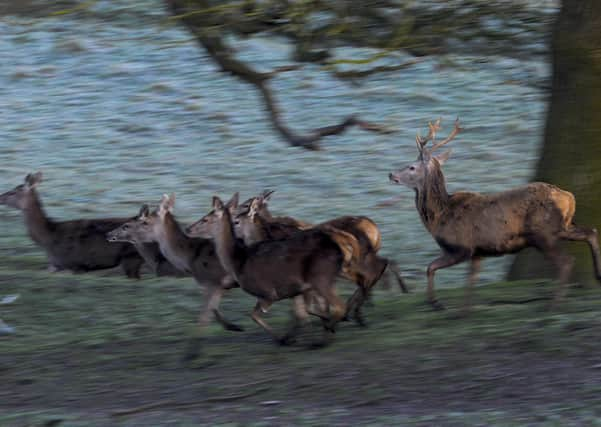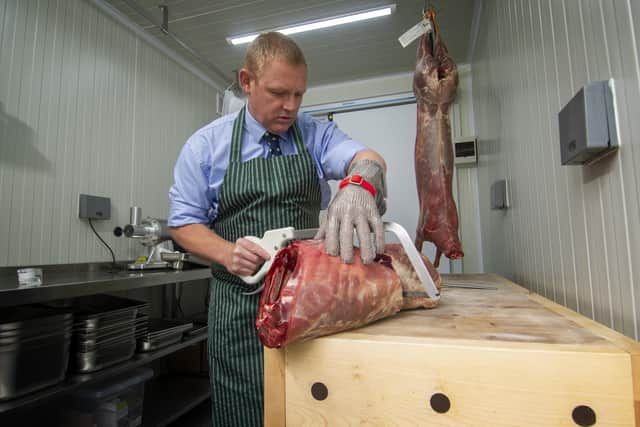How buying venison can avert Covid catastrophe: Sam Carlisle


A third of venison sold in the UK was imported, primarily from New Zealand, as our domestic supply couldn’t meet the market demand.
Prices for venison were high as a result. Venison farmers were flourishing, and culls of wild deer on estates were helpful additions to the bottom line, being paid in excess of £3/kg for in fur carcasses.
Advertisement
Hide AdAdvertisement
Hide AdIndeed, even at the height of the first lockdown, in April, research commissioned by the Scottish Venison Association (SVA), and carried out by the data consultants Kantar, showed that the venison market was worth in excess of £14m, and projected to grow.


Venison, after years of being seen as an exclusive meat, had finally entered the mass market.
On the report, SVA chairman Bill Bewsher said: “With this new research we are now much better informed, as well as having confirmation that there is healthy growth for venison across the retail sector.
“With this data, processors and other intermediaries can now go to the market with confidence and talk to buyers armed with evidence. Venison is performing better than other red meats in general and that is good news for the wild sector and for deer farmers.”
Advertisement
Hide AdAdvertisement
Hide AdNo sooner had these optimistic words been spoken in April than the true effect of Covid and the first lockdown became clear. Much of the venison market is based around restaurants. Chefs love serving venison because it is cheaper than other red meats, but has a cachet that allows them to charge a good margin. With restaurants, closed the key outlet for British venison vanished.
Deer in the UK have no natural predators, and, left unchecked, will double their population every year. This exponential expansion of grazers can have a severe impact on the surrounding countryside, eating not only farmers’ crops but wildflowers and tree growth.
To keep the population under control, deer culling had to continue throughout lockdown. With the main market for venison closed, but culling still continuing, there was a chronic oversupply, and prices plummeted. It has reached the point that many game dealers have simply stopped accepting venison, as they are unable to sell it on.
Not only is this an economic catastrophe for our deer farmers, but it also spells worry for our wildlife as well. Without the ability to put carcasses into the food chain, deer managers will be loath to continue the very necessary deer cull.
Advertisement
Hide AdAdvertisement
Hide AdFor those who manage deer, it is incongruous and ethically difficult to simply cull deer and leave them to rot in the field. An outlet for venison must be found or we risk seeing our ecosystems degraded by an expanding deer population.
As David Hooton, a deer officer for the Forestry Commission, confirmed: “The devastating impact of coronavirus on the restaurant trade has left the venison market teetering at its lowest ever level.
“Venison is a high-quality product, so is well placed to appeal to a wide range of consumers. Venison markets are also key to the future control and protection of both woodlands and arable crops; deer need to be managed across the country and having a stable venison supply chain is necessary to encourage and support this.”
In an effort to arrest this decline, the Forestry Commission has created the Wild Venison Working Group, which seeks to promote wild venison, especially direct to consumer sales. It is hoped that with additional marketing and education the venison market will start to recover.
Advertisement
Hide AdAdvertisement
Hide AdGiven the increasing interest we are all showing in our food, in particular its provenance and sustainability, there is no reason that this should not be successful. Venison is one of the most sustainable meats out there, by any metric.
Even avowed vegan and climate activist George Monbiot took to national television prior to the first lockdown, and ate venison which he himself had shot, educating viewers that we risk degrading the uplands without eating more venison.
Given the historically low price for venison, now is the time to head to your local butcher and ask for a venison steak, or indeed some venison sausages or burgers. They are leaner than most meat, utterly delicious and you can be sure that your Sunday lunch will be helping maintain Britain’s precious biodiversity.
Sam Carlisle is the Countryside Alliance’s shooting campaign manager.
Advertisement
Hide AdAdvertisement
Hide AdSupport The Yorkshire Post and become a subscriber today. Your subscription will help us to continue to bring quality news to the people of Yorkshire. In return, you’ll see fewer ads on site, get free access to our app and receive exclusive members-only offers. Click here to subscribe.
Comment Guidelines
National World encourages reader discussion on our stories. User feedback, insights and back-and-forth exchanges add a rich layer of context to reporting. Please review our Community Guidelines before commenting.